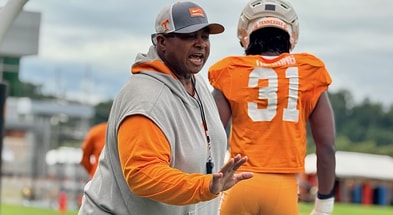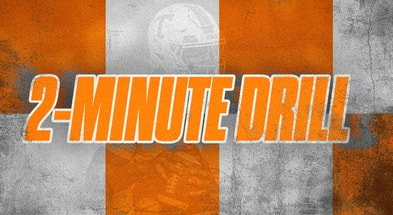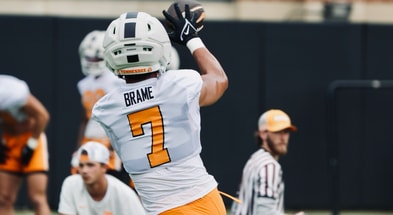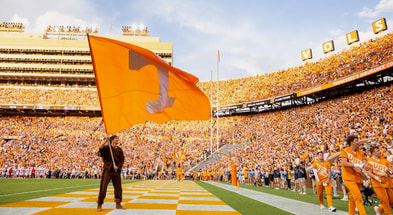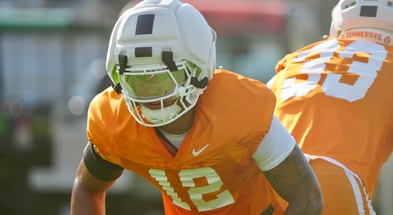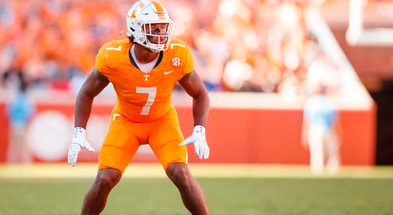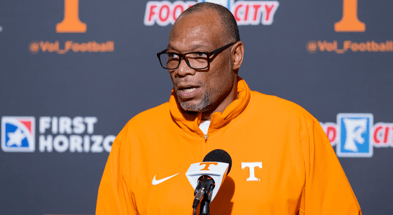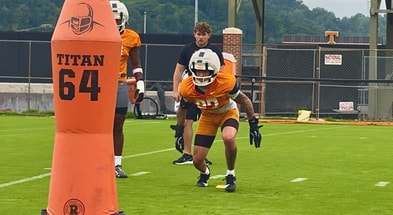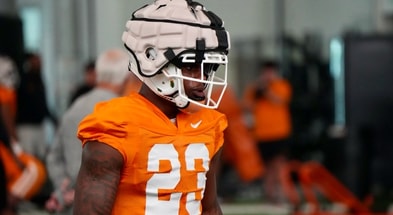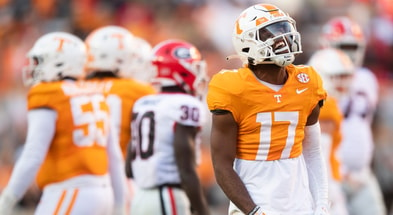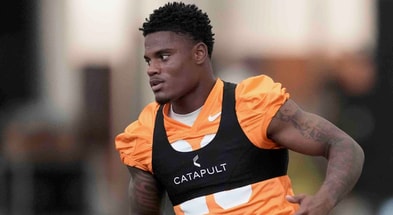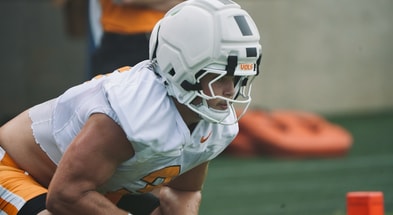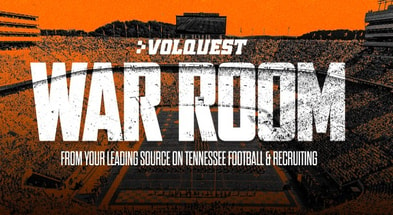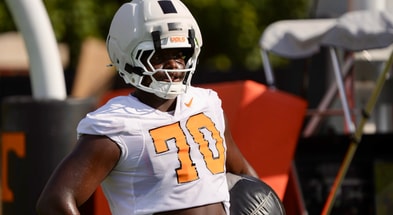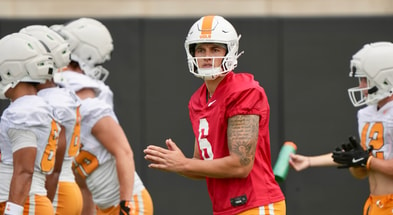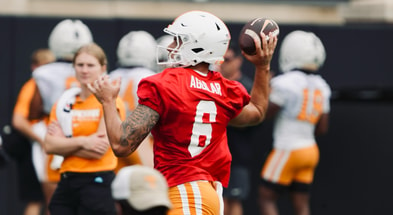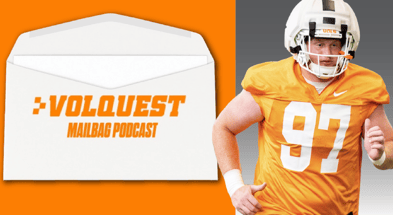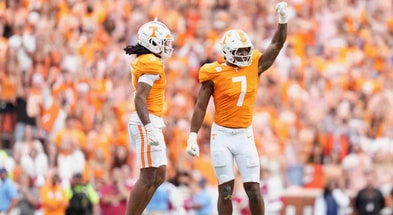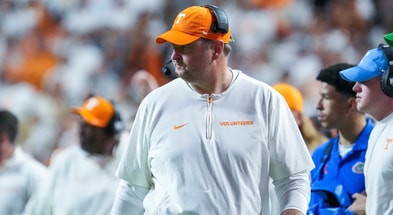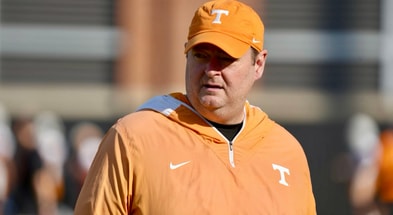What Tennessee offensive coordinator Joey Halzle said at the Knoxville Quarterback Club
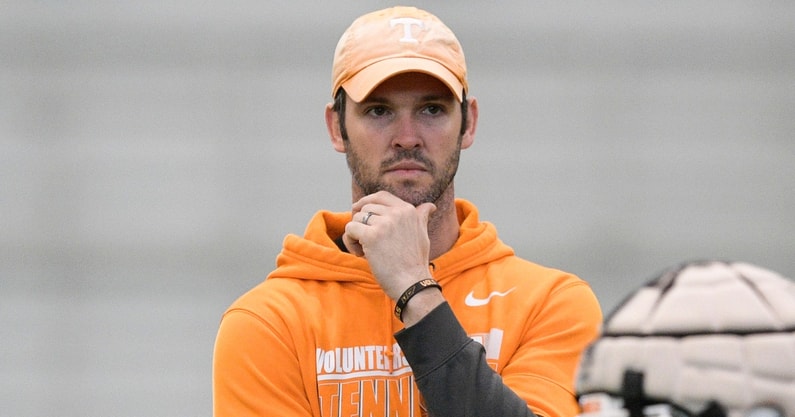
Tennessee offensive coordinator and quarterbacks coach Joey Halzle was the guest speaker Monday at the Knoxville Quarterback Club, looking back at the 59-3 win over UConn and updating the progress of the Vols on offense:
Opening Statement
“(Against UConn) it was fun getting to see a bunch of guys get out there — maybe guys that you don’t know as well that contribute a lot to the program — and play in front of their friends and family, contribute in a big way. And it was fun watching those guys circle up and go down the field from first, second, third string, fourth-string quarterback. It was kind of cool seeing a Shuler jersey out there running around again … that was cool.
“But it’s been fun watching these guys work, keep competing, playing hard for us every single week. Feel like we’re moving in the right direction. A lot out in front of us still, but everything we want for us still sitting right out in front of us right now. Got a big one coming this weekend that’s gonna go a long way to that. So we’re excited to keep this thing pushing in the right direction.”
What Tennessee has seen from Missouri’s defense so far
“Mizzou, what you see when you look at them are guys that have been on the field together for three, four years now. You go from (defensive) line, linebacker, secondary is junior, senior across the board. Nothing is better, a lot of goals are getting better in this game of football, so those guys out there playing each other with each other for three years straight, you’re seeing them play at a really high level. Their team that doesn’t make a lot of mistakes. They know what they play, they know how to adjust, they play it well and they present a very significant challenge out there, especially with the way the defensive coordinator likes to call it. He’s a pressure guy. He’s gonna pressure 50, 60% of the time. He’s gonna bring the heat, he’s gonna play man pressure. He’s gonna see if you can defeat it that day. So that’s the challenge out there at Columbia this weekend. It’s gonna be a big challenge, but we’re looking forward to it.”
What a typical week looks like for Tennessee’s offensive staff
“So Sunday morning when we get in, it starts with putting the previous game to bed. Do that. And around noon we get going, get a GA (graduate assistant) report because those guys are the ones that break down the kind nut-and-bolt it, spend a lot of time on their own. Get together around nine Sunday … and then (Monday) is all normal-down game plan. So first-, second-down situations. We get together with our guys (in the evening) evening and install normal-down game plan and then we’ll come back after that meeting and start our third downs and start scripting the next morning’s practice.
“And then Tuesday is all special situations, so red zone, high zone, third down, fourth down, all that type of stuff. Install that with the guys Tuesday night into Wednesday morning, practice it and then after that, get together as a staff, talk about two minute, four coming out, the ultra specific game stuff that night and then Thursday, that’s situational …”
The Michigan sign-stealing situation
“We feel confident that if someone is trying to do it within game, which we all understand is perfectly legal, that is why there’s three guys doing it in different colored (shirts) and protecting yourself. If they can get something stolen and communicated by the time the ball is snapped, good on them.
“If it’s something else, then you would have to go further … with how we do it, we feel comfortable that we have been able to play without that happening to us in game, legal, stuff like that.”
Tennessee’s play-calling process between Josh Heupel on the sideline and Halzle on the sideline
“It’s communal. It’s like we’ve been saying since the beginning, Coach Heupel as the head coach and being the architect of this offense, he’s got first, second, third say if he wants it. I’m up top and I’m giving him what I’m seeing and what I think we should get to and Coach will always have the final (say).”
Teams scripting the first 10-20 plays of a game
“Yeah, where we’re at, we don’t script the first 10-20 because of the way we play. Exactly to your point. We’re scripting first and second down usually and see where it goes from there because the ball bounces all over the place with all the different ways we like to spread the field. And you can end up with left hash to right hash like that when you didn’t think there was any chance someone would bounce his feet open, reverse on you. And if you want to play with tempo, you have to have all that second, third, fourth thought, right? Go right from the beginning. So we’ll try to get like a three-, four-play set together and then go from there. And we get so many what we call unscathed looks because people just see us differently, that you kind of have to be ready to adjust mid-drive, first drive of the game. Like a team is all four-down single-high (safety) and you’re three-down two-high. Alright, what do we get to right now? Because you don’t want to stop, slow down, make it all figure out. No, we gotta go. So what are we getting to in all these situations? That’s how we have to call plays. So if you were trying to script too much, it’s like you’re saying you give your guys, hey these are the first 15 plays and on play two, they’re on something different, now you’re messing with them so they know what the first couple thoughts that we want to get to, but they’re also used to adjusting as well. Hey, this is not what we practice. Boom, we’re ready for something new.”
Top 10
- 1New
Top 25 College QBs
Ranking best '25 signal callers
- 2
Top 25 Defensive Lines
Ranking the best for 2025
- 3
Big Ten Football
Predicting 1st loss for each team
- 4Hot
College Football Playoff
Ranking Top 32 teams for 2025
- 5Trending
Tim Brando
Ranks Top 15 CFB teams for 2025
Get the Daily On3 Newsletter in your inbox every morning
By clicking "Subscribe to Newsletter", I agree to On3's Privacy Notice, Terms, and use of my personal information described therein.
How quickly Tennessee coaches are getting the next play call in
“It’s basically called as the are guys usually being tackled, trying to find out what bodies are, we’re calling it right there. You can see it sometimes on the TV copies, you see the black sheets go up. It’s like, here it comes.”
Tennessee’s play call on the wide-open touchdown to Ramel Keyton
“They were going single-high (safety), so it was actually, Squirrel (White) was to the field and just somehow ended up all the way on the other hash. He was playing hard, he was blocking on third-and-short and he ended up chasing this guy all the way across the field. And I don’t know if they were making a field boundary call or a call to the speed, which is where the slot is, but they were playing single-high safety and the field and the boundary safety …. they put nobody in the post. And yeah, if we get guys for that, that’d be awesome …”
Running Joe Milton in short-yardage situations
“We’ve done that a couple times with a few sneaks and shovels, trying to get him in the end zone earlier in the season. With him being a little bit banged up throughout the season, like sometimes you don’t wanna shove him into 2,000 pounds of man (on the defensive line). (Milton’s size) presents a positive thing for us. And I think something that’s difficult for other teams to defend, at that size and the ability, is he’s not like, you know, Lamar Jackson who’s really dangerous on the edge and he’s not like a huge guy. He can feed it up in there and he’s like a big back. So again, to your point, there’s absolutely ways to use it. Situationally, for sure.
Tennessee’s philosophy when it comes to spreading the field on offense
“Yeah, so starting with us, we like to spread it and make you defend the whole 53 (yards across the field). I think a lot of times when you reduce it, and teams do it well, you do what you do and if you do it well, it’ll be successful, but we like to make you defend the whole thing with the width of the field because when you attack it vertically, whether someone’s playing man or zone, you’re putting one-on-one situations and you’re forcing. If someone wants to play halfway, be a half-run, half-pass player, they have to show up in one or the other. They can’t play where you reduce the space, now you’re letting somebody play in two different spots and react to the run right away … when people are playing tight, a lot of that is they’re trying to create space for the guys on the back end of it by creating rubs, by creating mismatches, by creating confusion of setting picks, getting guys out in different spots. So it’s just a different thought process of how am I trying to get this guy, how am I trying to create space for the guy with the ball? Whether it’s running it or catching it. There’s ways to do both. There’s positives of both.
“The thing is you gotta kind of be one or the other. You can’t live in both worlds or you kind of do everything okay and now you’re just, what’s your identity? Like our guys know what our identity is and then if we have a couple plays a game that break from that identity, like cool, they’re fine with it as opposed to we showed up with half a game, reduce sets and we’re gonna run all these pick plays. It’d be like, what are you doing? That’s not us. If that makes sense.”
Spread offenses adjusting play calls on the fly based on defensive fronts
“Yeah, you get to dictate what the defense can do because by spreading that space out, they have to decide what they want to defend. They don’t get to defend all of it.”
